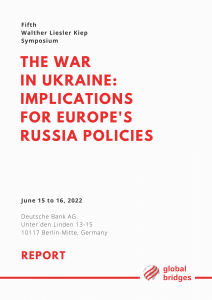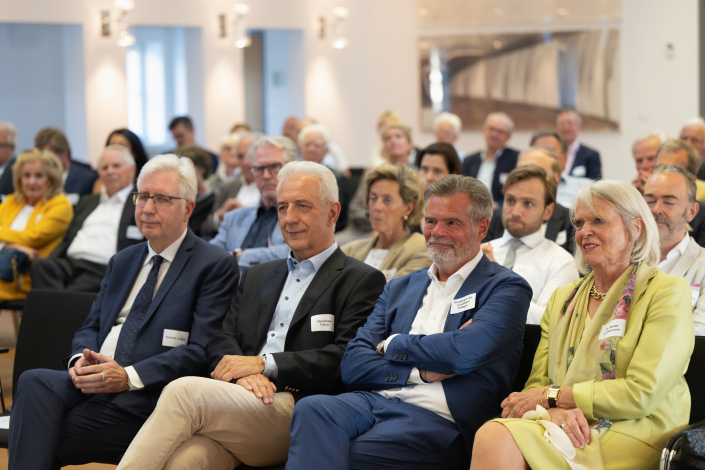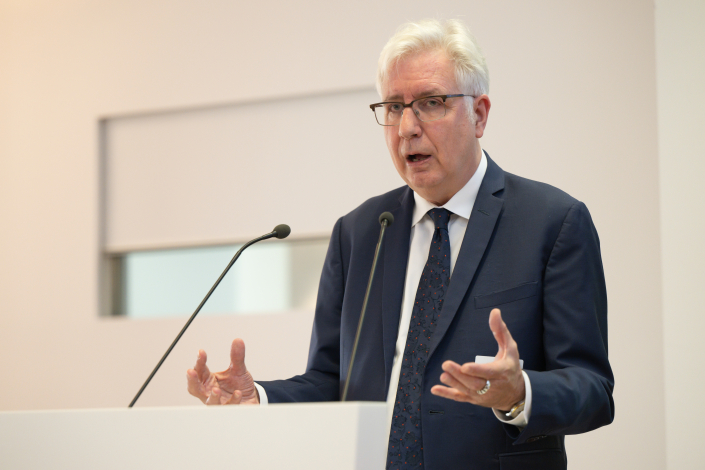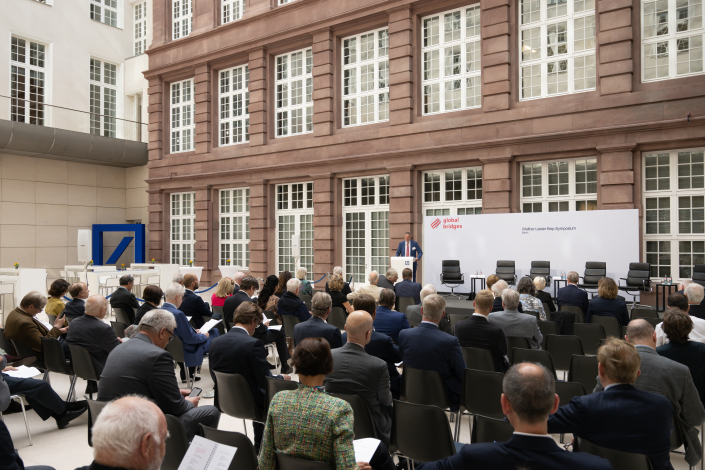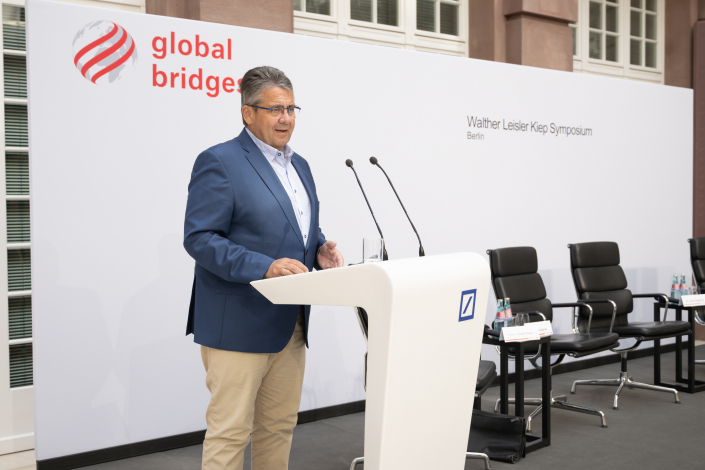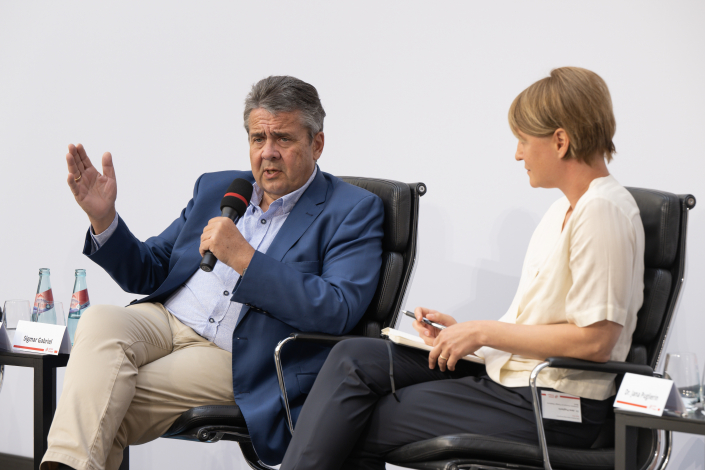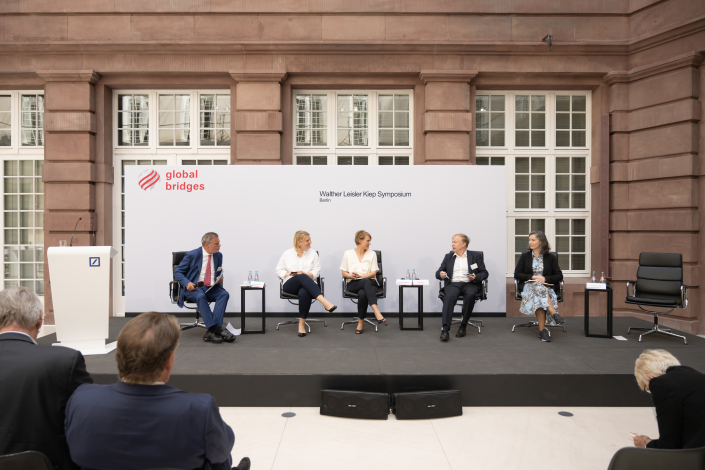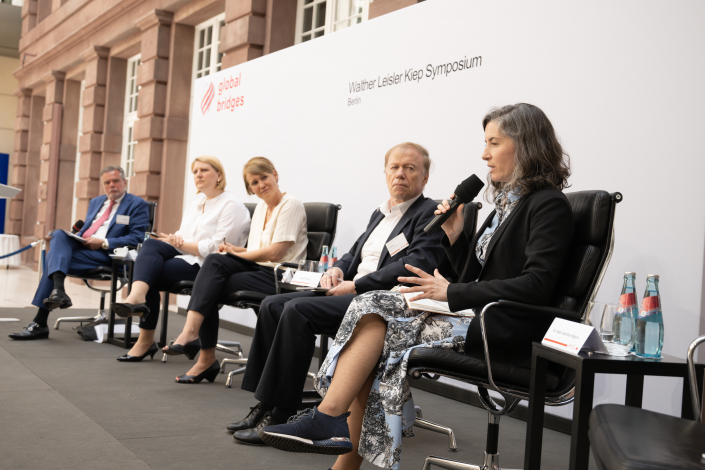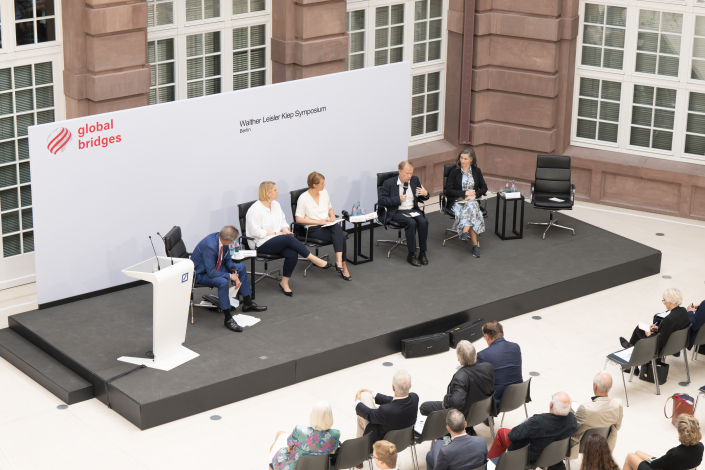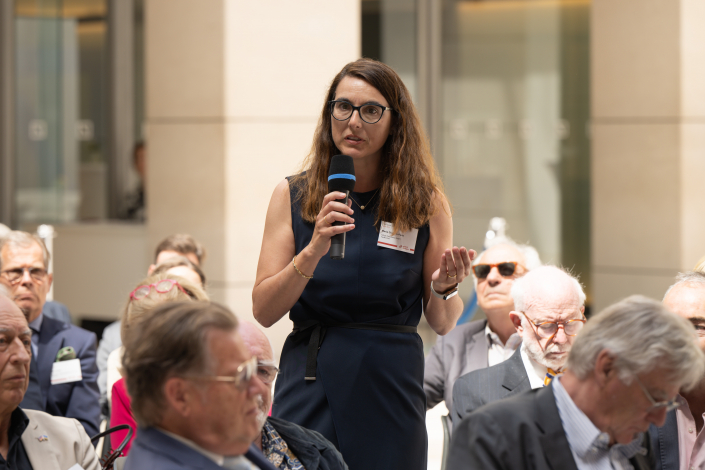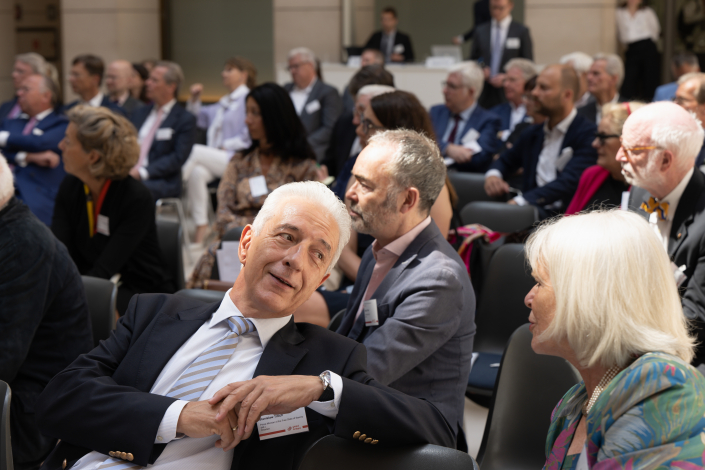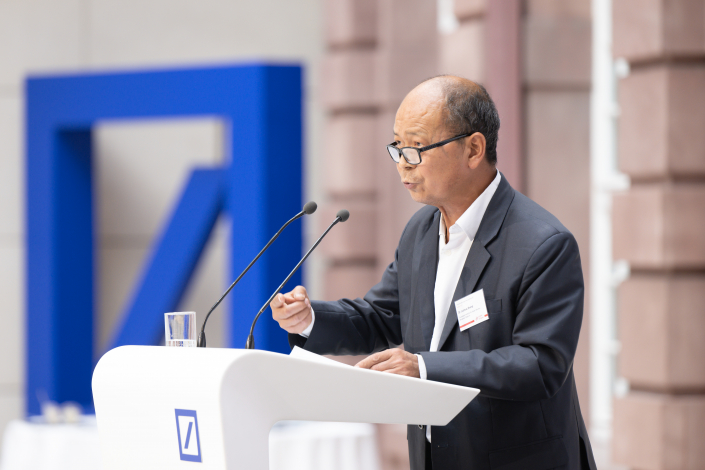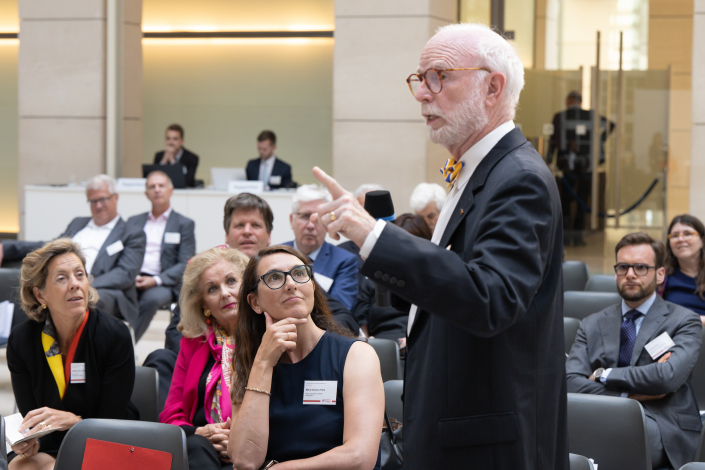A New European Security Order
Russia’s war of conquest has shattered the illusion that a collaborative European security order is possible. As Russia will be a security threat for the foreseeable future, one panelist stressed that “European security can now only be organized against Russia, not with Russia.” In light of the new systemic conflict that is on the rise, the panel stressed the need to formulate and implement a new Euro-Atlantic security architecture. Coincidentally, since the end of the Trump administration, cooperation has once again replaced confrontation in transatlantic relations, with the Biden administration’s renewed commitment to NATO proving as crucial as ever in times of uncertainty.
Given the Northern and Eastern European states’ geographic location on the frontline and their leadership in supporting Ukraine, the center of gravity within NATO is likely to shift from Central Europe eastward. These countries have warned time and again against the expansionist ambitions of the Kremlin, based on their historical knowledge and painful experience with Russian imperialism. Within NATO, Poland and other frontline countries – together with the US – were thought to assume policy leadership, given that the French-German motor has lost credibility and trust, as several participants emphasized. Berlin and Paris were accused of being indecisive at several critical junctions, potentially undermining their ability to lead a European defense project. In contrast, the preference of Northern and Eastern European countries to organize their joint security through NATO has unequivocally been reinvigorated, and NATO will remain the central building bloc of the European security architecture.
“Zeitenwende”
A sober analysis is a prerequisite for sound policy reformulation, and it must acknowledge that Germany’s Russia policies have failed. Neither Wandel durch Handel nor Wandel durch Annäherung have been the magic formula to deal with an autocrat as many may have hoped. While Germany has been a strong advocate of the soft-power and economic diplomacy approach in the past, it was noted that cooperation based on selective engagements can only be applied to a very limited extent today. In a world that has become increasingly competitive, new ideas and a firm stance are needed, while keeping open channels for political dialogue with the Kremlin wherever possible.
Marking not only a watershed moment in Germany’s Russia policies, but in its defence policy more generally, the term Zeitenwende encapsulates the needed policy reformulation. Yet, as several panelists stressed, German Chancellor Olaf Scholz’ February announcement is only the beginning of a reformulation process, rather than its end point – and it needs to be sustained with political capital and material resources. In particular, even though the measure entail considerable changes to an array of policy fields, it remains to be seen which strategic goals they should achieve and how they can be operationalized as well as implemented.
The Reconstruction of Ukraine
The second panel dealt with economic questions pertaining to Europe’s policies towards Russia and Ukraine. While reconstruction is a chance for Ukraine to overcome the consequences of war, the actual needs are difficult to assess while the war is ongoing. As such, what a post-war Ukraine may look like and how it may be reconstructed crucially depend on the result of the war. A rump state Ukraine without access to the sea – possibly one of Putin’s strategic goals – would eventually become a Russian vassal, irrespective of the amount of support received. What seems clear, however, is that the costs of reconstruction will be enormous, with one panelist describing the rebuilding of Ukraine as a challenge as tantamount as the reconstruction of Germany after the Second World War – and likewise requiring a commitment in the spirit of the Marshall Plan.
Funding for reconstruction efforts could stem from frozen Russian assets in the West, although there are significant legal hurdles involved. Moreover, private sector investment, particularly in the digital services sector, which has seen significant growth before the war, could also provide certain resources. In order to fully reap the opportunities of private investment in Ukraine, however, the country’s business environment needs improvement to facilitate the inflow of foreign direct investment and attract innovative companies. In this regard, closer integration with Europe is a crucial, although not a precondition for private businesses to step-up their commitments.
Irrespective of the investments made by the private sector, external government funding will prove pivotal for the reconstruction of Ukraine. However, any such foreign commitment should not be unconditional: Although Ukraine has made significant progress in the years prior to the war, the country still requires comprehensive reforms in terms of state capacity, rule of law, and the prevention of corruption. There was concern among the panel that the provision of unconditional funding would serve as an invitation for oligarchs to join the reconstruction bonanza without accountability.
Another hurdle for reconstruction efforts may be the provision of long-term security. An end of the war does not necessarily provide the level of security needed for reconstruction, as, for instance, a contentious armistice would give Moscow the leverage to threaten any meaningful endeavors. Therefore, Kyiv needs a more robust security environment with relevant guarantees, although the precise nature of such an arrangement is not only difficult to foresee, but will have an impact on the specific needs and opportunities of reconstruction.
In a more immediate way, reconstruction also has an humanitarian dimension, as it includes the rebuilding of basic infrastructure and the removal of unexploded munitions, mines and rockets so as to facilitate the return of displaced persons. Considering that Ukraine has faced demographic challenges even before the war, the return of refugees – both internal and external – will play a central role in supplying reconstruction efforts with the necessary human capital. While some aspects of reconstruction can only be tackled once the end has ended, these humanitarian aspects can and should be addressed right away.
Sanctions Against Russia
Support for Ukraine ought to go hand-in-hand with continued pressure on Russia. The sanctions packages adopted by the EU are without precedent and were adopted swiftly. Russia has effectively been cut off from the most important capital markets globally. However, the Russian economy has now bounced back from the immediate sanctions shock, with the domestic situation being described as “hopeless, but not serious,” by one panelist. Soaring commodity prices have reduced the impact of sanctions – and Putin is yet to face the fiscal imperative to end the war.
In its assessment of the effectiveness of the sanctions in place, the panel was somewhat divided: On the one hand, Russia is already suffering from limited access to high-end technology and lower rates of productivity across its economy. Such hardship is also evidenced by the Kremlin’s eagerness to place sanctions relief on the agenda of negotiations. On the other hand, the effects of sanctions are mainly felt by the Russian elites and within urban centers. Furthermore, the country was able to counterbalance lost export revenues to Europe in Asia, adversely impacting the effectiveness of sanctions. The hope was expressed that sanction costs will gradually increase over time.
Beyond Russia itself, maintaining sanctions pressure will likely affect global trade and finances. In the short-term, they exacerbate already existing supply-shortage driven inflation. The Kremlin appears to leverage food staples, fossil fuel production and rare earth extraction to increase the global costs of opposition to its war. In these three areas, Russia’s share in global production means that short-term supply shortages increase prices, with significant ripple effects being felt throughout the world’s economies. In the longer-term, the impact of sanctions on global trade decreases, as Russia’s share of global Gross Domestic Product (GDP) is negligible, and strategically important imports from Russia can be replaced in the mid-term.
The Demise of Globalization?
The third panel discussed the mid- and long-term implications of the war for the global political and economic order. There was broad agreement that the war in Ukraine should be understood as part of a larger struggle of non-democratic actors attempting to overturn the rules-based international order. The fear was expressed that Russia’s invasion of Ukraine could provide China with a blueprint to annex Taiwan. Indeed, Beijing appears to keenly watch the conflict and the international reactions to it, in a bid to draw lessons for its own expansionist endeavors. It may have only been due to Ukraine’s steadfastness and resilience, allowing for a united Western response to be formulated and implemented, that prevented China from seeing a window of opportunity with regards to Taiwan. Therefore, as one panelist pointedly put it, “the defense of Taiwan begins in Ukraine”.
Just like the Korean war in the 1950s, which consolidated the fronts of the Cold War, the war in Ukraine has begun to reshape the global order. In particular, rather than a process of deglobalization, the panel described an acceleration and materialization of a bloc confrontation between the US and China. Whereas during the Cold War era such confrontation bred economic boundaries, it is unlikely that full economic bifurcation will take place this time in age: Economic interlinkages between the two blocs are significantly more developed now than they were when the US adopted its policy of economic containment throughout the Cold War era. Even if both sides have an intrinsic interest in economic decoupling, their mutual interdependence means that this process may take years – if not even decades.
Due to existing interdependencies, a mixed development – with economic relations being maintained in one field, and decoupling taking place in others that are deemed strategically sensible – was seen as the most likely scenario. One central conclusion of the panel was that aspects that used to connect us, be it trade, technology or connectivity, are increasingly being (mis)used to divide us. Rather than abstaining from these activities, the awareness of such dependencies ought to prompt a rethink of relations with, for instance, China, based on the lessons learned from failed Russia policies. What is needed is a clear awareness of the degree of asymmetry in existing interdependencies, coupled with a clear policy on how to manage them.
With its updated Belt and Road Initiative, China is increasingly focusing on soft power and technology, rather than debt-induced dependencies. With less conditionality than the current Western model, where aid is often tied to governance reform, the Chinese offer may be more attractive to local elites. Hence, in their competition with China for influence, markets and resources, Europe, the US and other democracies must not only increase their commitments, but also the quality of their development cooperation – and hold themselves to high standards of good governance at home so as to counter perceptions of hypocrisy in the global South.
On the subject of climate change, the need to promote multilateralism was made abundantly clear by the panel. Instead of having been banned from the international community, Russia made a conscious decision to “walk out” in blatant disregard for international law. Against this background, global action in general, and selective engagement with China in particular, seem crucial in the attempt to stay as close to the two-degree target as possible. However, potential dependencies should be kept in mind and a contingency plan should be drawn up, for instance in case of a Chinese invasion of Taiwan. With the trend towards bloc confrontation and partial economic bifurcation unlikely to abate, the panel stressed the need to rethink China policies so as to avoid dependencies that can be weaponized – as was the case with fossil fuels from Russia.
Conclusion and Recommendations
The Russian war against Ukraine is arguably the biggest challenge to the European security order since the end of the Cold War. The February 24 multi-directional invasion can be understood as the culmination of a process of geopolitical reassertion which, rhetorically, began years before the 2008 Russo-Georgian War. The continuous escalation of this process is, at least partially, the result of a clear miscalculation on the part of the West. A number of implications for Europe’s Russia policies follow:
The idea that Russia could be changed through accommodation and trade was flawed. Just as indecision is a decision, inaction is also a form of action – and the West’s deterrence strategy proved wholly inadequate. With his invasion of Ukraine, Putin also attacked the four pillars of the post-Cold War European order: integration in the EU, solidarity in NATO, liberal democracy and the inviolability of national borders. At the same time, however, these pillars have also been reinvigorated by the current crisis, especially in view of Finland and Sweden’s NATO membership bids or the granting of EU accession candidate status to Ukraine and Moldova. There are tentative signs that the EU is increasing its commitment to the Western Balkans, but if kept in the waiting room for too long, their frustrations may grow and they could seek alternatives to the Euro-Atlantic path.
While Ukraine certainly deserves a European perspective in its national survival and defense of the European continent against Russia, the country has a long way to go before EU accession can become a reality. Indeed, irrespective of the war, the accession process ought to be by the book and formal negotiations should only begin once the conditional reforms with regards to fostering the rule of law and anti-corruption are carried out.
Russia may not be rewarded by giving it a carte blanche or allowing Putin to drive Western alliances apart. Multilateralism and cooperation with democratic partners – whether in NATO, the EU or the G7 – is as crucial as ever to formulate a coherent and effective policy that is attentive to potential interdependencies that can be weaponized. Even though to Putin, economic well-being does not seem to be a priority, the West needs to maintain and strengthen sanctions pressure, as “other autocrats are watching.” Other global economies – South Korea, Turkey, India, among others – should be pressured to introduce sanctions of their own, as this will increase the effectiveness of the existing embargos.
One undeniable outcome of Russia’s war against Ukraine is the sea change in Germany’s security and foreign policy that Chancellor Olaf Scholz referred to in his Zeitenwende-speech. Signifying a turn of the times and a historical geopolitical shift, the series of measures entail considerable changes to Germany’s defence, finance, and energy policies – that, for the general public, would have been unthinkable only a few weeks prior to Russia’s invasion. Even though these changes may look impressive, only time will tell whether they reflect a truly systemic, strategic shift in the German foreign and security policy, rather than a one-off emergency response. Already in the aftermath of Russia’s annexation of Crimea in 2014, Germany promised to assume greater responsibility in international security matters. The ensuing burden-sharing efforts proved lackluster.
In order to substantiate Berlin’s rhetoric shift with action this time around, it appears crucial to nurture a strategic culture in Germany’s public discourse and the decision-making infrastructure on security matters. The idea of a German national security council may be promising in this regard. With such reforms, the often-incremental nature of policy making in Berlin can be overcome and the fast-changing realities on the ground be accounted for. Only through such swift action, Germany can convince its partners in the East that it does take their security concerns seriously – and assume a position of leadership within the EU.
Concerning the question of when and how the war may end, the situation in Ukraine has underscored a key challenge associated with political forecasting: The subject of study is constantly evolving. What seems clear, however, is that the options available at the negotiation table crucially depend on the situation on the battlefield. Therefore, Ukraine deserves our full support – militarily and otherwise. Ukraine is defending our values, our security and the rules-based international order we desire. We should acknowledge and honor this.

